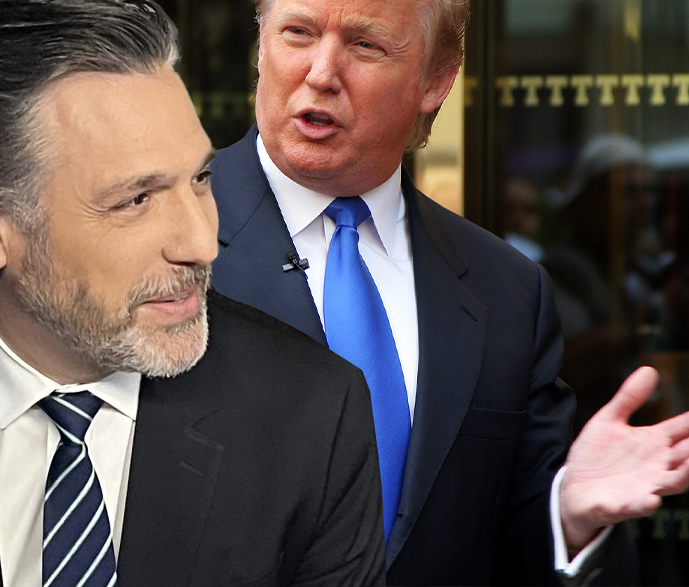TRENTON, N.J. — The political journey of Bill Spadea, a former New Jersey radio host turned gubernatorial candidate, and his affiliated group, Elect Common Sense, has been marked by a series of fundraising controversies and operational missteps that have raised questions about transparency and intent.
Launched in 2023 as a political action committee (PAC) to support “common sense” Republican candidates, Elect Common Sense has instead become a lightning rod for criticism, with allegations of mismanagement, self-dealing, and misleading fundraising tactics dogging its existence.The group’s troubles began shortly after its inception, when it positioned itself as a grassroots movement to counter what Spadea described as the “far-left grip” on New Jersey politics.
During the campaign, President Trump said he doesn’t even know who Bill Spadea is.
Promising to back candidates aligned with conservative values, Elect Common Sense quickly amassed significant funds, raising nearly $934,000 in 2024 alone, according to its year-end report with the New Jersey Election Law Enforcement Commission (ELEC). However, a closer look revealed that the vast majority of these funds—virtually all—were funneled into operating expenses, particularly fundraising costs, rather than supporting candidates. This pattern of prioritizing self-sustenance over its stated mission sparked early skepticism about the group’s priorities.
The controversy deepened with reports of questionable fundraising practices. Elect Common Sense employed aggressive tactics, including automatic recurring donation checkboxes and solicitations that often highlighted President Donald Trump’s name and likeness without prominently featuring Spadea until the fine print. This strategy led to confusion among donors, many of whom were retirees from out-of-state, such as an 85-year-old from Georgia and a 73-year-old from Washington state, who unknowingly contributed hundreds of dollars. Some donors, expecting to support Trump’s agenda, were shocked to learn their money had gone to Spadea’s PAC, prompting cancellations of credit cards and demands for refunds.
Critics have labeled this a deliberate tactic to exploit Trump’s popularity, a charge that gained traction when the Trump organization criticized Spadea for falsely using the president’s likeness in fundraising appeals.Financial irregularities further tarnished the group’s reputation. Spadea, who serves as honorary chairman, has been linked to significant personal payments from related entities. The Common Sense Club, a nonprofit he founded, reportedly paid Spadea’s LLC, BillSpadea.Com LLC, $225,000, with an additional $12,000 transferred just days before the June 2025 Republican primary—shortly after which Spadea lost to Jack Ciattarelli. These payments, drawn from small-dollar donations as modest as $10, have been defended by Spadea as legitimate “sponsorship fees” for podcast production, but critics argue they represent a betrayal of donor trust, with funds intended for conservative causes allegedly diverted to personal gain.
The timing of the $12,000 payment, made as Spadea’s campaign faltered, has fueled speculation of a last-ditch effort to secure personal funds before defeat.The group’s track record with candidate support has also been dismal. Despite raising substantial sums, Elect Common Sense and its sister organization, Common Sense Wins, have contributed less than 1% of their funds to Republican candidates or organizations.
For instance, of the $264,000 raised by Elect Common Sense in its early months, only $500 went to the Bergen County Republican Organization, with the rest spent on consultants and fundraising. This inefficiency has led rivals like Ciattarelli to accuse Spadea of prioritizing personal enrichment over party support, a narrative that gained momentum during the heated 2025 gubernatorial primary debates.
Spadea’s broader political ventures, including the Common Sense Club and Common Sense Wins, have mirrored these issues. The Common Sense Club, intended to promote fiscal conservatism, has been criticized for contributing almost nothing to candidates despite significant fundraising.
Meanwhile, Common Sense Wins, an independent expenditure group, has similarly failed to channel funds effectively, with expenditures largely benefiting political consultants like Bill Stepien and George Gilmore. These patterns suggest a systemic focus on self-perpetuation rather than the grassroots movement Spadea champions.


As Spadea’s gubernatorial bid ended in a second-place finish on June 10, 2025, the controversies surrounding Elect Common Sense have left a lasting stain. Supporters who once saw the group as a vehicle for change now question its legitimacy, with some labeling it a “grift” to enrich Spadea, who stepped away from his radio career to focus on the campaign. The group’s reliance on out-of-state donors, coupled with its minimal impact on elections, has fueled a narrative of opportunism rather than principled advocacy.
While Spadea and his allies dismiss these criticisms as politically motivated, the cumulative weight of these follies suggests a troubling disconnect between the group’s rhetoric and its actions, leaving its future—and Spadea’s political prospects—uncertain.
